克隆技术演讲
克隆技术作文1000字

克隆技术作文1000字英文回答:Cloning: A Technological Advancement with Ethical Implications.Cloning technology, a revolutionary scientific breakthrough, has the potential to transform various fields, including medicine, agriculture, and conservation. It involves creating a genetically identical copy of anexisting organism. While the potential benefits of cloning are numerous, it also raises significant ethical concerns that warrant careful consideration.Benefits of Cloning.Medical advancements: Cloning technology has the potential to revolutionize medicine by enabling thecreation of patient-specific cells and tissues for transplantation, reducing the risk of rejection. It couldalso lead to the development of cures for degenerative diseases and the production of personalized vaccines.Agricultural benefits: Cloning can improveagricultural productivity by creating livestock with desirable traits, such as increased meat or milk production, and resistance to diseases. It can also accelerate the conservation of endangered species.Scientific research: Cloning provides valuableinsights into developmental biology and genetics. Itenables scientists to study the effects of specific genes and environmental factors on an organism's development.Ethical Concerns.Human cloning: The prospect of human cloning raises numerous ethical concerns, including the potential for creating designer babies or reproducing individuals for financial gain. It also raises questions about the autonomy and identity of cloned human beings.Animal welfare: Cloning animals for commercial purposes raises concerns about the well-being of the cloned animals themselves. Considerations must be made to ensure that their lives are not compromised for the benefit of humans.Genetic diversity: Extensive cloning could lead to a reduction in genetic diversity within species, which could make populations more vulnerable to environmental challenges and diseases.Conclusion.Cloning technology presents both potential benefits and ethical challenges. While it has the potential to revolutionize medicine, agriculture, and scientific research, it is crucial to proceed with caution and address the associated ethical concerns. A thorough understanding of the technology, its potential implications, and the development of appropriate regulations are essential to ensure responsible and ethical applications.中文回答:克隆技术,一项具有伦理影响的科技进步。
英语演讲稿3分钟 主题克隆
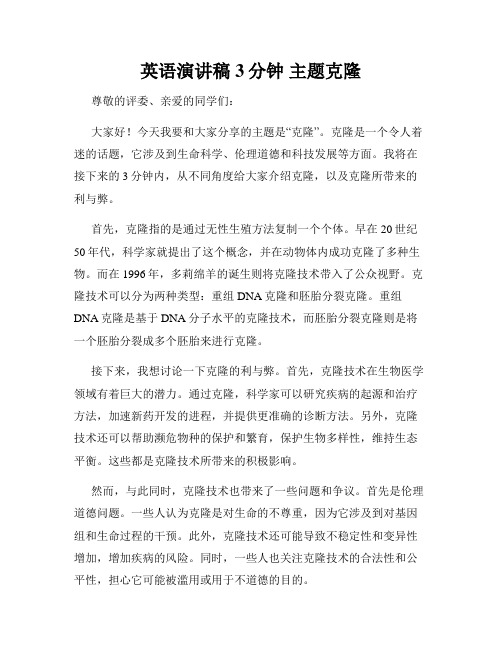
英语演讲稿3分钟主题克隆尊敬的评委、亲爱的同学们:大家好!今天我要和大家分享的主题是“克隆”。
克隆是一个令人着迷的话题,它涉及到生命科学、伦理道德和科技发展等方面。
我将在接下来的3分钟内,从不同角度给大家介绍克隆,以及克隆所带来的利与弊。
首先,克隆指的是通过无性生殖方法复制一个个体。
早在20世纪50年代,科学家就提出了这个概念,并在动物体内成功克隆了多种生物。
而在1996年,多莉绵羊的诞生则将克隆技术带入了公众视野。
克隆技术可以分为两种类型:重组DNA克隆和胚胎分裂克隆。
重组DNA克隆是基于DNA分子水平的克隆技术,而胚胎分裂克隆则是将一个胚胎分裂成多个胚胎来进行克隆。
接下来,我想讨论一下克隆的利与弊。
首先,克隆技术在生物医学领域有着巨大的潜力。
通过克隆,科学家可以研究疾病的起源和治疗方法,加速新药开发的进程,并提供更准确的诊断方法。
另外,克隆技术还可以帮助濒危物种的保护和繁育,保护生物多样性,维持生态平衡。
这些都是克隆技术所带来的积极影响。
然而,与此同时,克隆技术也带来了一些问题和争议。
首先是伦理道德问题。
一些人认为克隆是对生命的不尊重,因为它涉及到对基因组和生命过程的干预。
此外,克隆技术还可能导致不稳定性和变异性增加,增加疾病的风险。
同时,一些人也关注克隆技术的合法性和公平性,担心它可能被滥用或用于不道德的目的。
尽管克隆技术带来了争议,但我们不能否认它的巨大潜力和应用前景。
因此,我们应该以负责任的态度来推进克隆技术的研究和应用。
我们需要建立相关法律法规来规范克隆技术的使用,确保它的安全性和伦理性。
同时,也要加强科学教育,提高大众对克隆技术的认识和理解,消除恐惧和偏见。
克隆技术是一项颇具争议的科学研究领域。
它既带来了许多利益,又涉及重大的伦理和道德问题。
我们需要认真权衡其中的利弊,遵循科学规范和伦理准则,在推进克隆技术的同时保护生命的尊严和人类的尊重。
最后,我希望我们每个人都能对克隆这个话题保持开放的心态,并以科学的态度面对克隆技术。
克隆技术,就在我身边,的作文

克隆技术,就在我身边,的作文英文回答:Cloning technology, it's right beside me. Cloning technology refers to the process of creating an identical copy of an organism or cell. It has been a topic of great interest and controversy in both the scientific and ethical fields.In my opinion, cloning technology has both its advantages and disadvantages. On the one hand, it offers potential benefits in various areas. For example, in agriculture, cloning can be used to produce genetically identical plants with desirable traits, such as disease resistance or high yield. This can lead to increased food production and improved crop quality. In medicine, cloning technology has the potential to revolutionize organ transplantation by creating organs that are a perfect match for patients, reducing the risk of rejection. Moreover, cloning can also be used in scientific research to studythe development and progression of diseases, leading to a better understanding and potential treatments.On the other hand, cloning technology also raises ethical concerns. The process of cloning involves manipulating and altering the natural order of life. It raises questions about the sanctity of life and the potential misuse of cloning technology. For example, human cloning raises concerns about the creation of "designer babies" or the exploitation of cloning for unethical purposes. Cloning also raises concerns about the loss of genetic diversity and the potential negative impact on ecosystems.Despite the potential benefits, I believe it is important to approach cloning technology with caution and careful consideration. It is crucial to establish clear regulations and guidelines to prevent the misuse of cloning technology. Additionally, public awareness and education about the ethical implications of cloning are essential.In conclusion, cloning technology is a double-edgedsword. It has the potential to bring about significant advancements in various fields, but it also raises ethical concerns. It is important to strike a balance between scientific progress and ethical considerations to ensure the responsible and ethical use of cloning technology.中文回答:克隆技术,就在我身边。
克隆的议论稿
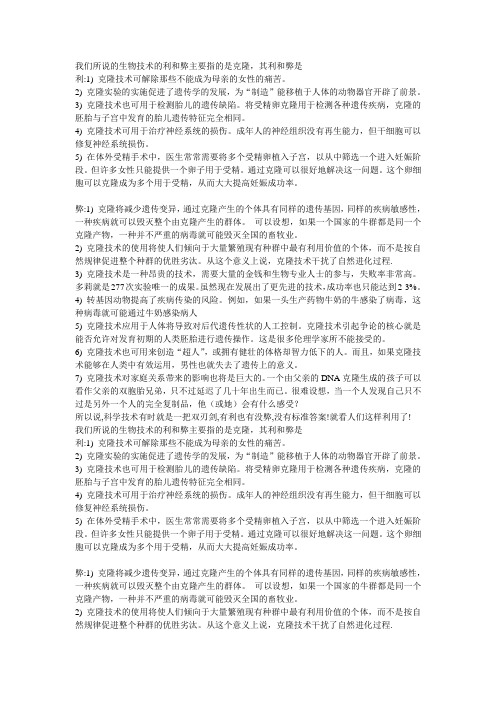
我们所说的生物技术的利和弊主要指的是克隆,其利和弊是利:1) 克隆技术可解除那些不能成为母亲的女性的痛苦。
2) 克隆实验的实施促进了遗传学的发展,为“制造”能移植于人体的动物器官开辟了前景。
3) 克隆技术也可用于检测胎儿的遗传缺陷。
将受精卵克隆用于检测各种遗传疾病,克隆的胚胎与子宫中发育的胎儿遗传特征完全相同。
4) 克隆技术可用于治疗神经系统的损伤。
成年人的神经组织没有再生能力,但干细胞可以修复神经系统损伤。
5) 在体外受精手术中,医生常常需要将多个受精卵植入子宫,以从中筛选一个进入妊娠阶段。
但许多女性只能提供一个卵子用于受精。
通过克隆可以很好地解决这一问题。
这个卵细胞可以克隆成为多个用于受精,从而大大提高妊娠成功率。
弊:1) 克隆将减少遗传变异,通过克隆产生的个体具有同样的遗传基因,同样的疾病敏感性,一种疾病就可以毁灭整个由克隆产生的群体。
可以设想,如果一个国家的牛群都是同一个克隆产物,一种并不严重的病毒就可能毁灭全国的畜牧业。
2) 克隆技术的使用将使人们倾向于大量繁殖现有种群中最有利用价值的个体,而不是按自然规律促进整个种群的优胜劣汰。
从这个意义上说,克隆技术干扰了自然进化过程.3) 克隆技术是一种昂贵的技术,需要大量的金钱和生物专业人士的参与,失败率非常高。
多莉就是277次实验唯一的成果。
虽然现在发展出了更先进的技术,成功率也只能达到2-3%。
4) 转基因动物提高了疾病传染的风险。
例如,如果一头生产药物牛奶的牛感染了病毒,这种病毒就可能通过牛奶感染病人5) 克隆技术应用于人体将导致对后代遗传性状的人工控制。
克隆技术引起争论的核心就是能否允许对发育初期的人类胚胎进行遗传操作。
这是很多伦理学家所不能接受的。
6) 克隆技术也可用来创造“超人”,或拥有健壮的体格却智力低下的人。
而且,如果克隆技术能够在人类中有效运用,男性也就失去了遗传上的意义。
7) 克隆技术对家庭关系带来的影响也将是巨大的。
一个由父亲的DNA克隆生成的孩子可以看作父亲的双胞胎兄弟,只不过延迟了几十年出生而已。
关于克隆技术的辩论赛正方3辩发言稿
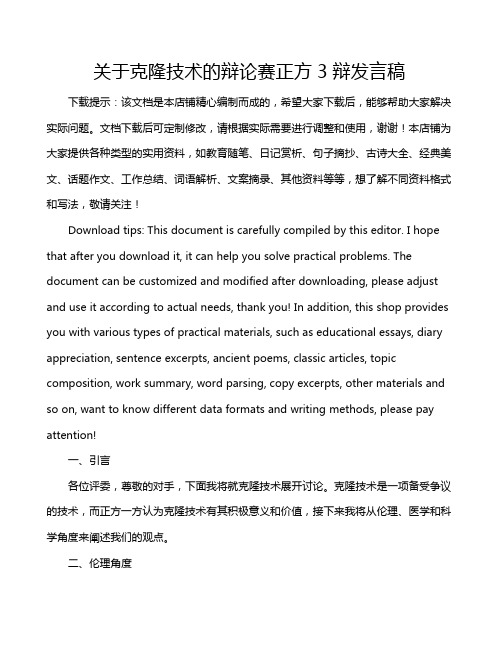
关于克隆技术的辩论赛正方3辩发言稿下载提示:该文档是本店铺精心编制而成的,希望大家下载后,能够帮助大家解决实际问题。
文档下载后可定制修改,请根据实际需要进行调整和使用,谢谢!本店铺为大家提供各种类型的实用资料,如教育随笔、日记赏析、句子摘抄、古诗大全、经典美文、话题作文、工作总结、词语解析、文案摘录、其他资料等等,想了解不同资料格式和写法,敬请关注!Download tips: This document is carefully compiled by this editor. I hope that after you download it, it can help you solve practical problems. The document can be customized and modified after downloading, please adjust and use it according to actual needs, thank you! In addition, this shop provides you with various types of practical materials, such as educational essays, diary appreciation, sentence excerpts, ancient poems, classic articles, topic composition, work summary, word parsing, copy excerpts, other materials and so on, want to know different data formats and writing methods, please pay attention!一、引言各位评委,尊敬的对手,下面我将就克隆技术展开讨论。
克隆英语介绍演讲稿
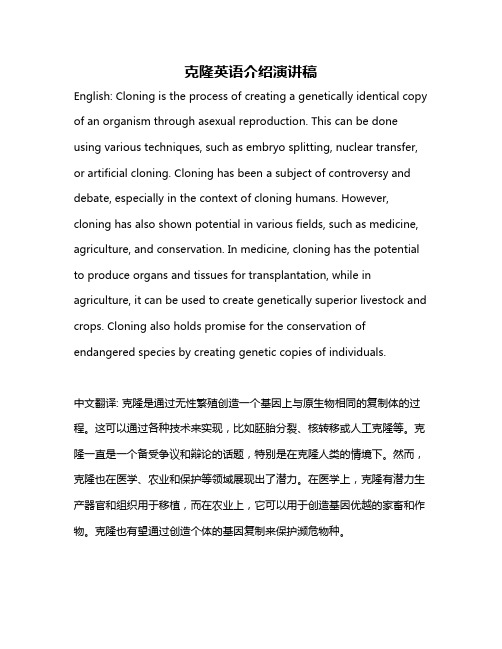
克隆英语介绍演讲稿English: Cloning is the process of creating a genetically identical copy of an organism through asexual reproduction. This can be done using various techniques, such as embryo splitting, nuclear transfer, or artificial cloning. Cloning has been a subject of controversy and debate, especially in the context of cloning humans. However, cloning has also shown potential in various fields, such as medicine, agriculture, and conservation. In medicine, cloning has the potential to produce organs and tissues for transplantation, while in agriculture, it can be used to create genetically superior livestock and crops. Cloning also holds promise for the conservation of endangered species by creating genetic copies of individuals.中文翻译: 克隆是通过无性繁殖创造一个基因上与原生物相同的复制体的过程。
这可以通过各种技术来实现,比如胚胎分裂、核转移或人工克隆等。
克隆一直是一个备受争议和辩论的话题,特别是在克隆人类的情境下。
演讲克隆技术-课件(-精)

克隆技术的劣势
• 缺乏人类演讲的情感和表达能力。 • 有可能被滥用和误导。 • 无法处理特殊和复杂的演讲场景技术帮助学生提 高演讲技巧和表达能力。
智能客服系统
使用演讲克隆技术提供更逼真 的人机对话体验,提升客户满 意度。
政治宣传系统
运用演讲克隆技术扩大政治影 响力,提高政治宣传效果。
技术原理
人工智能和机器学习
通过机器学习算法,使机 器能够学习和模仿人类的 演讲风格。
语音合成和语音识别
使用语音合成技术生成逼 真的演讲声音,并使用语 音识别技术将文字转化为 语音。
数据分析和模拟
利用大数据分析和模拟技 术,提高机器对演讲内容 和情感的理解。
应用场景
1 培训和教育领域
2 商业和营销领域
帮助学生练习演讲技巧,提供个性化的教 学辅助。
创造逼真的演讲广告,吸引更多的客户。
3 政治宣传领域
应用于政治演讲,扩大政治影响力。
4 医疗和保健领域
帮助医生和护士进行康复治疗指导,提高 病人的治疗效果。
优劣势分析
克隆技术的优势
• 提供高质量的演讲结果。 • 可同时处理多个演讲任务。 • 节省人力和时间成本。
前景展望
1
发展前景
演讲克隆技术将会越来越普遍,被广泛应用于各个行业和领域。
2
可能的风险和挑战
随着技术发展,可能会出现滥用和虚假信息的问题,需要加强监管。
3
推广应用的建议
需要进行更多的研究和实践,提高演讲克隆技术的准确性和适用性。
演讲克隆技术-课件(PPT精)
本演讲将介绍演讲克隆技术的原理和应用场景,以及它的优势、局限性和成 功案例。还将展望未来发展前景并提出推广应用的建议。
Humancloning克隆对人类有好处正方演讲稿
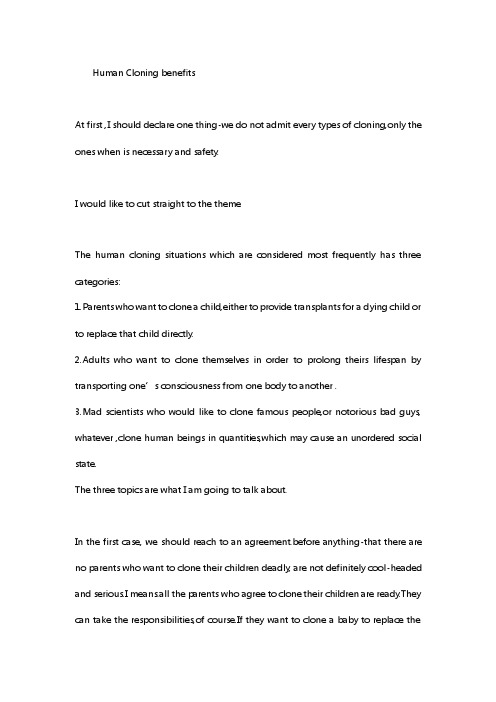
Human Cloning benefitsAt first ,I should declare one thing-we do not admit every types of cloning,only the ones when is necessary and safety.I would like to cut straight to the themeThe human cloning situations which are considered most frequently has three categories:1.Parents who want to clone a child,either to provide transplants for a dying child or to replace that child directly.2.Adults who want to clone themselves in order to prolong theirs lifespan by transporting one’s consciousness from one body to another .3.Mad scientists who would like to clone famous people,or notorious bad guys, whatever ,clone human beings in quantities,which may cause an unordered social state.The three topics are what I am going to talk about.In the first case, we should reach to an agreement.before anything-that there are no parents who want to clone their children deadly, are not definitely cool-headed and serious.I means.all the parents who agree to clone their children are ready.They can take the responsibilities,of course.If they want to clone a baby to replace thedying one,it’s OK.They will look after him just like a nurtural newborn one,which looks very similar to his dead brother,or her dead sister.There have no questions. And in the other hand, clone a baby, who can provide transplants for the one who is dying now,in some peoples’mind,seems like caring nothing about the human rights of the babies.But is it unusual?There are thousands of women who accept an induced abortion surgery everyday in this world.What they had done are to ignore the fact that so many women are both damaging their health and just leave the babies’rights off the door, and arrest the parents who just want see their children growing up. They are killing the possibilities for parents to regain their sweet homes. They care the minority, not the majority. How clever they are!And then, the second case, frankly speaking,was totally fiction. It is said that we got no evidence which can prove that consciousness can transport between different bodies. But with the use of transplants from a cloned human,the original human could truly prolong his life in that way.But in our opinion,that actions are not included in the proper using of cloning. We do not accept every types of cloning, like what I said just now-we are in favor of two types of cloning only-The cloning for heart broken parents and for medical use when essential.Transplants for a health man will never be accepted.And the last one,which we think,lack the basic knowledge about cloning. First, the cloning technology is difficult, very difficult to reach a certain number, even if thereare so few clones will come into the world, may not be the threat to human survival. Secondly, the acceptance of things that people have a process, the human moral concepts can be changed, and now can not accept what the future may not be acceptable.the development of technology has its own internal rules, the cell technology is unstoppable. Even if people disagree on the cloning of people do not say categorically do not need to engage in human society, human cloning.Human cloning research will address some theoretical issues in developmental biology provide an opportunity, but also may provide useful technique to humans. Do not always think about the ethics of human cloning, legal and moral, which easily tied the hands of scientists and creativity.If fully coordinate the scientific and social values, individual values and group values, temporary and long-term value of the relationship between the value, to help improve the quality of human survival and sustainable development criteria, as our values, cloning technology itself will be in play and social development in the future of its great potential. As long as it is conducive to improving the quality of human survival and sustainable development of cloning technology as a standard of value, can make them better for the cloning of human and social services.。
神奇的克隆技术作文600

神奇的克隆技术作文600英文回答:The advent of genetic engineering and cloning technology has opened up a new era of scientific exploration and potential medical advancements. Cloning, a technique that involves creating genetically identical copies of an existing organism, has captured the imagination of scientists, ethicists, and laypeople alike.One potential application of cloning is in the field of medicine. By creating cloned tissues and organs, scientists hope to address the critical shortage of organs available for transplantation. This could revolutionize healthcare, providing hope to countless patients suffering from organ failure.Another promising application lies in the realm of agriculture. Cloning could improve the efficiency and sustainability of food production by creating geneticallysuperior livestock and crops. This has the potential to enhance food security and nutrition worldwide.However, cloning technology also raises ethical concerns. One primary concern is the potential for human cloning, which presents complex moral and societal implications. Ethical guidelines need to be established to ensure responsible use of this technology and prevent its misuse for unethical purposes.中文回答:克隆技术作为基因工程的一项重要技术,在医学和农业领域拥有着广阔的应用前景。
克隆技术 英语作文

克隆技术英语作文Title: Cloning Technology: A Controversial Breakthrough。
Cloning technology has emerged as one of the most contentious topics in contemporary science. While it holds promises for medical advancements and genetic research, it also raises profound ethical, moral, and societal concerns. In this essay, we will delve into the intricacies ofcloning technology, exploring its potential benefits and ethical dilemmas.Firstly, it is imperative to understand the scientific basis of cloning. Cloning involves the creation of genetically identical copies of organisms, cells, or DNA fragments. There are several methods of cloning, including somatic cell nuclear transfer (SCNT), where the nucleus ofa somatic cell is transferred into an egg cell whosenucleus has been removed, and reproductive cloning, which aims to create a new individual organism.One of the most significant potential benefits of cloning technology lies in its applications in medicine. Cloning can be instrumental in producing genetically identical animals for biomedical research, allowing scientists to study diseases and develop new treatments. Moreover, therapeutic cloning holds promise for generating tissues and organs for transplantation, thereby addressing the shortage of donor organs and reducing the risk of organ rejection.However, the ethical implications of cloning cannot be overlooked. One of the primary concerns is the moral status of cloned organisms. Critics argue that cloning undermines the uniqueness and dignity of individual beings, raising questions about identity and autonomy. Moreover, there are fears of exploitation and commodification of cloned organisms, particularly in commercial contexts.Another ethical dilemma associated with cloning is the potential for misuse and abuse. Cloning technology could be misappropriated for purposes such as reproductive cloning of humans, which raises profound ethical, social, and legalconcerns. The prospect of cloning humans raises questions about individuality, family dynamics, and the sanctity of life.Furthermore, cloning technology poses significant challenges to societal norms and values. It blurs the boundaries between natural and artificial, challenging traditional notions of reproduction and parenthood. The prospect of designer babies, where genetic traits can be manipulated and selected, raises concerns about eugenics and social inequality.In addition to ethical concerns, there are practical limitations and risks associated with cloning technology. Cloned organisms often suffer from health issues and abnormalities, leading to high rates of morbidity and mortality. Moreover, the process of cloning is technically challenging and inefficient, with a low success rate and high cost.In conclusion, cloning technology represents a double-edged sword, with the potential for significant benefitsand profound ethical dilemmas. While it holds promises for medical advancements and genetic research, it also raises fundamental questions about identity, autonomy, and the sanctity of life. As we navigate the complexities of cloning technology, it is essential to approach it with caution, ensuring that ethical considerations and societal values guide its responsible development and application.。
关于克隆技术的英语作文80词
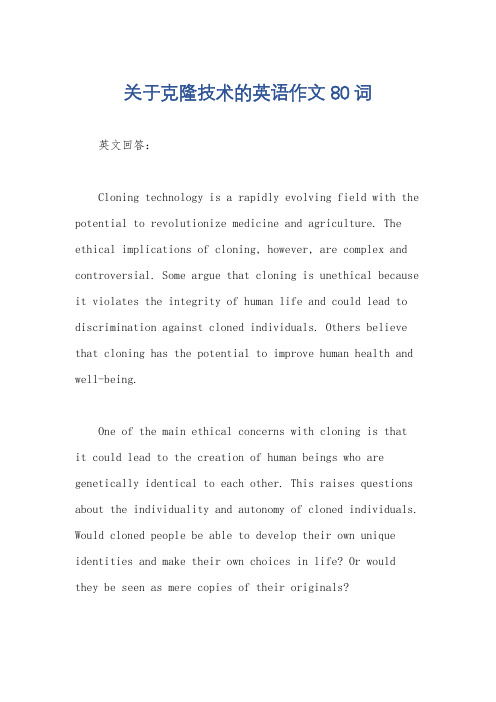
关于克隆技术的英语作文80词英文回答:Cloning technology is a rapidly evolving field with the potential to revolutionize medicine and agriculture. The ethical implications of cloning, however, are complex and controversial. Some argue that cloning is unethical because it violates the integrity of human life and could lead to discrimination against cloned individuals. Others believe that cloning has the potential to improve human health and well-being.One of the main ethical concerns with cloning is that it could lead to the creation of human beings who are genetically identical to each other. This raises questions about the individuality and autonomy of cloned individuals. Would cloned people be able to develop their own unique identities and make their own choices in life? Or would they be seen as mere copies of their originals?Another ethical concern with cloning is that it could be used to create designer babies. This would allow parents to select the traits of their children, such as their intelligence, athletic ability, or physical appearance. This raises concerns about eugenics and the potential for discrimination against individuals who do not meet certain genetic standards.Despite these ethical concerns, cloning technology has the potential to revolutionize medicine. Cloning could be used to create replacement organs for patients with organ failure. It could also be used to develop new treatmentsfor diseases such as Alzheimer's and Parkinson's. Cloning could also be used to improve agricultural yields and create new food sources.The ethical implications of cloning are complex and controversial. It is important to carefully consider these implications before moving forward with this technology.中文回答:克隆技术是一个迅速发展的领域,具有革新医学和农业的潜力。
有关克隆技术的作文
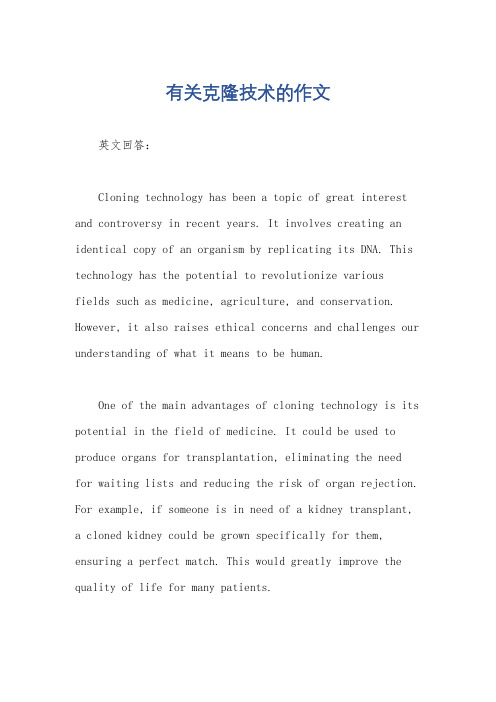
有关克隆技术的作文英文回答:Cloning technology has been a topic of great interest and controversy in recent years. It involves creating an identical copy of an organism by replicating its DNA. This technology has the potential to revolutionize variousfields such as medicine, agriculture, and conservation. However, it also raises ethical concerns and challenges our understanding of what it means to be human.One of the main advantages of cloning technology is its potential in the field of medicine. It could be used to produce organs for transplantation, eliminating the needfor waiting lists and reducing the risk of organ rejection. For example, if someone is in need of a kidney transplant, a cloned kidney could be grown specifically for them, ensuring a perfect match. This would greatly improve the quality of life for many patients.In agriculture, cloning technology could be used to produce genetically identical crops that are resistant to diseases and pests. This would lead to increased cropyields and reduced reliance on pesticides, benefiting both farmers and consumers. Additionally, cloning could be used to preserve endangered species by creating clones of individuals that are at risk of extinction.However, there are also ethical concerns associated with cloning technology. One of the main concerns is the potential for abuse and exploitation. For example, cloning could be used to create armies of identical soldiers, erasing individuality and autonomy. It could also lead to a loss of genetic diversity, making populations more vulnerable to diseases and environmental changes.Furthermore, cloning raises questions about the nature of identity and individuality. If we can create anidentical copy of a person, does that mean they have the same thoughts, feelings, and experiences? Are they truly the same person or just a replica? These philosophical questions challenge our understanding of what it means tobe human and raise concerns about the potential loss of uniqueness and diversity.中文回答:克隆技术近年来成为了一个备受关注和争议的话题。
克隆演讲稿
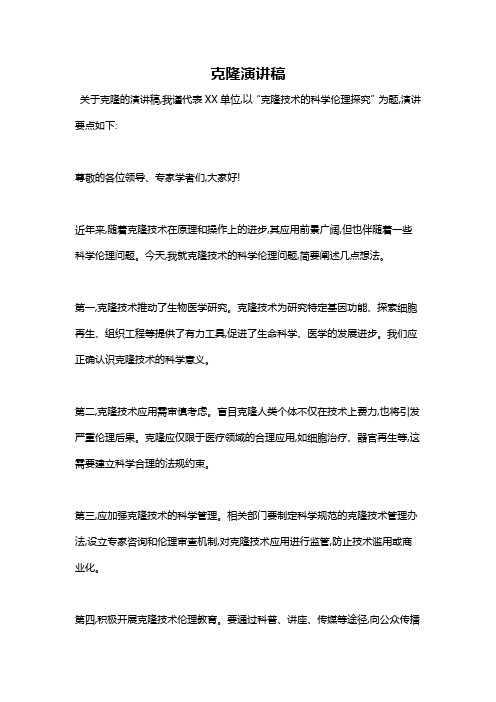
克隆演讲稿
关于克隆的演讲稿,我谨代表XX单位,以“克隆技术的科学伦理探究”为题,演讲要点如下:
尊敬的各位领导、专家学者们,大家好!
近年来,随着克隆技术在原理和操作上的进步,其应用前景广阔,但也伴随着一些科学伦理问题。
今天,我就克隆技术的科学伦理问题,简要阐述几点想法。
第一,克隆技术推动了生物医学研究。
克隆技术为研究特定基因功能、探索细胞再生、组织工程等提供了有力工具,促进了生命科学、医学的发展进步。
我们应正确认识克隆技术的科学意义。
第二,克隆技术应用需审慎考虑。
盲目克隆人类个体不仅在技术上费力,也将引发严重伦理后果。
克隆应仅限于医疗领域的合理应用,如细胞治疗、器官再生等,这需要建立科学合理的法规约束。
第三,应加强克隆技术的科学管理。
相关部门要制定科学规范的克隆技术管理办法,设立专家咨询和伦理审查机制,对克隆技术应用进行监管,防止技术滥用或商业化。
第四,积极开展克隆技术伦理教育。
要通过科普、讲座、传媒等途径,向公众传播
克隆技术的科学知识,普及伦理规范,引导社会形成科学理性的价值观念。
克隆技术是双刃剑,既充满应用前景,也伴有风险。
面对这项新兴技术,我们必须处理好技术创新与伦理规范的关系,在推进科技进步的同时,关注其对人类健康与福祉可能产生的影响。
通过立法、监管和科学教育等手段,使克隆技术朝着更科学、更合理的方向发展。
谢谢大家!。
基因克隆载体演讲稿范文
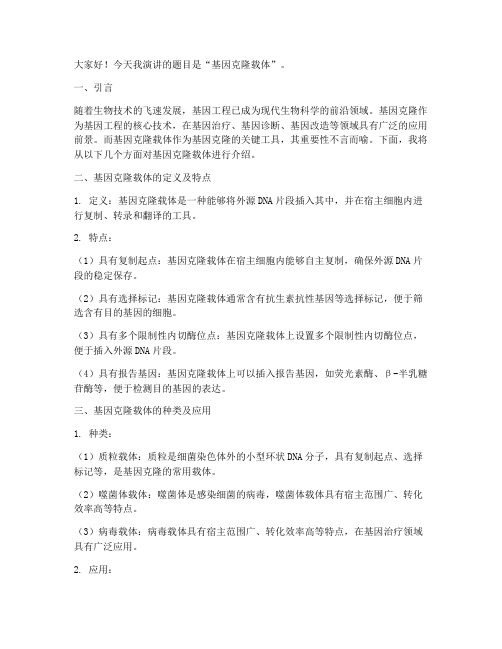
大家好!今天我演讲的题目是“基因克隆载体”。
一、引言随着生物技术的飞速发展,基因工程已成为现代生物科学的前沿领域。
基因克隆作为基因工程的核心技术,在基因治疗、基因诊断、基因改造等领域具有广泛的应用前景。
而基因克隆载体作为基因克隆的关键工具,其重要性不言而喻。
下面,我将从以下几个方面对基因克隆载体进行介绍。
二、基因克隆载体的定义及特点1. 定义:基因克隆载体是一种能够将外源DNA片段插入其中,并在宿主细胞内进行复制、转录和翻译的工具。
2. 特点:(1)具有复制起点:基因克隆载体在宿主细胞内能够自主复制,确保外源DNA片段的稳定保存。
(2)具有选择标记:基因克隆载体通常含有抗生素抗性基因等选择标记,便于筛选含有目的基因的细胞。
(3)具有多个限制性内切酶位点:基因克隆载体上设置多个限制性内切酶位点,便于插入外源DNA片段。
(4)具有报告基因:基因克隆载体上可以插入报告基因,如荧光素酶、β-半乳糖苷酶等,便于检测目的基因的表达。
三、基因克隆载体的种类及应用1. 种类:(1)质粒载体:质粒是细菌染色体外的小型环状DNA分子,具有复制起点、选择标记等,是基因克隆的常用载体。
(2)噬菌体载体:噬菌体是感染细菌的病毒,噬菌体载体具有宿主范围广、转化效率高等特点。
(3)病毒载体:病毒载体具有宿主范围广、转化效率高等特点,在基因治疗领域具有广泛应用。
2. 应用:(1)基因克隆:基因克隆载体可以将目的基因插入其中,实现目的基因的扩增、纯化等。
(2)基因表达:基因克隆载体可以将目的基因插入宿主细胞内,实现目的基因的表达和调控。
(3)基因治疗:基因治疗是利用基因工程技术治疗遗传病和某些疾病,基因克隆载体是实现基因治疗的关键工具。
四、总结基因克隆载体在基因工程领域具有重要作用,其种类繁多、应用广泛。
随着生物技术的不断发展,基因克隆载体将更加完善,为人类健康事业做出更大的贡献。
谢谢大家!。
未来的克隆技术作文
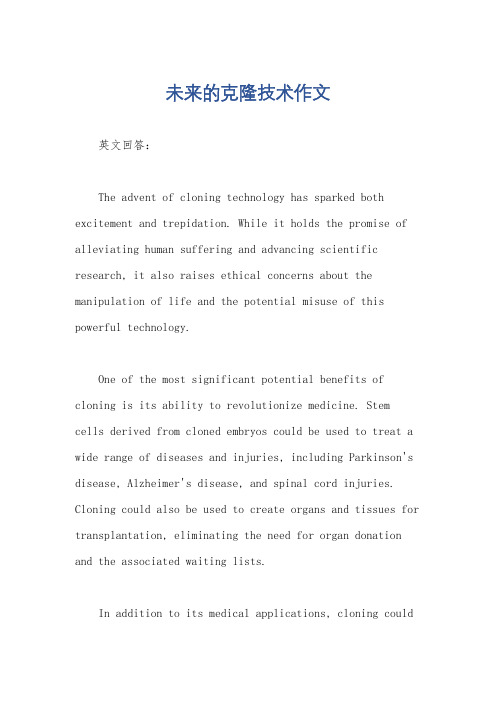
未来的克隆技术作文英文回答:The advent of cloning technology has sparked both excitement and trepidation. While it holds the promise of alleviating human suffering and advancing scientific research, it also raises ethical concerns about the manipulation of life and the potential misuse of this powerful technology.One of the most significant potential benefits of cloning is its ability to revolutionize medicine. Stemcells derived from cloned embryos could be used to treat a wide range of diseases and injuries, including Parkinson's disease, Alzheimer's disease, and spinal cord injuries. Cloning could also be used to create organs and tissues for transplantation, eliminating the need for organ donation and the associated waiting lists.In addition to its medical applications, cloning couldalso have a profound impact on agriculture and conservation. Cloning could be used to produce livestock with desirable traits, such as increased milk production or resistance to disease. It could also be used to preserve endangered species and restore biodiversity.However, cloning also raises a number of ethical concerns. One concern is that cloning could be used to create "designer babies," genetically engineered to possess certain desirable traits. This could lead to a societywhere the wealthy and powerful have access to superior genes, exacerbating existing social inequalities.Another ethical concern is that cloning could be usedto create human beings for organ harvesting or other exploitative purposes. This could lead to a commodification of human life and a violation of human rights.It is important to note that these concerns are not inevitable consequences of cloning technology. With careful regulation and ethical guidelines, it is possible toharness the potential benefits of cloning while mitigatingthe risks.In order to ensure the safe and ethical use of cloning technology, it is essential to engage in a public dialogue about its implications. This dialogue should involve scientists, ethicists, policymakers, and the general public. It is only through a collective effort that we can shapethe future of cloning technology and ensure that it is used for the benefit of humanity.中文回答:克隆技术未来的展望。
克隆技术作文500字以上

克隆技术作文500字以上英文回答:Cloning technology is the process of creating a genetically identical copy of an existing organism. Cloning is a complex and controversial procedure that has the potential to revolutionize the way we treat diseases, produce food, and even create new life forms.There are two main types of cloning: reproductive cloning and therapeutic cloning. Reproductive cloning creates a genetically identical copy of an existing organism, while therapeutic cloning creates embryonic stem cells that can be used to repair or replace damaged tissue.Reproductive cloning has been used to create animals such as Dolly the sheep and Snuppy the dog. However, reproductive cloning is still in its early stages, and there are many ethical concerns surrounding its use. One of the main concerns is that reproductive cloning could leadto the creation of designer babies, or babies that are genetically engineered to have certain traits.Therapeutic cloning has the potential to revolutionize the way we treat diseases. Embryonic stem cells can be used to repair or replace damaged tissue, which could lead to new treatments for diseases such as Parkinson's disease and Alzheimer's disease. However, therapeutic cloning alsoraises ethical concerns. One of the main concerns is that therapeutic cloning could lead to the destruction of human embryos.Overall, cloning technology is a complex and controversial issue. There are many potential benefits to cloning, but there are also many ethical concerns that need to be addressed. It is important to weigh the potential benefits of cloning against the ethical concerns before making any decisions about the use of this technology.中文回答:克隆技术是创建一个与现有生物具有相同基因的复制品的过程。
克隆技术这篇作文
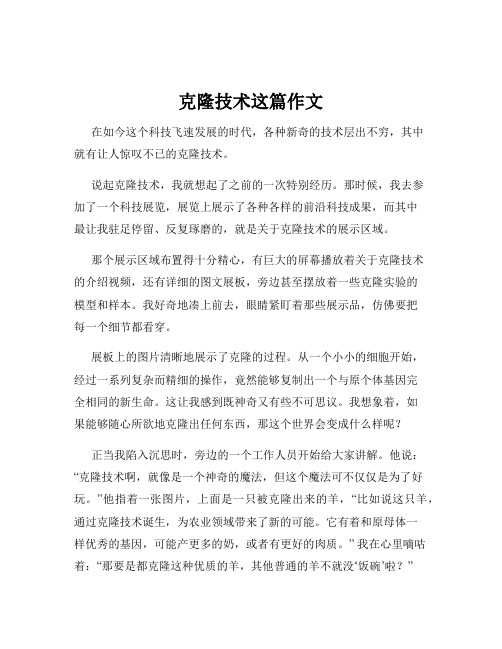
克隆技术这篇作文在如今这个科技飞速发展的时代,各种新奇的技术层出不穷,其中就有让人惊叹不已的克隆技术。
说起克隆技术,我就想起了之前的一次特别经历。
那时候,我去参加了一个科技展览,展览上展示了各种各样的前沿科技成果,而其中最让我驻足停留、反复琢磨的,就是关于克隆技术的展示区域。
那个展示区域布置得十分精心,有巨大的屏幕播放着关于克隆技术的介绍视频,还有详细的图文展板,旁边甚至摆放着一些克隆实验的模型和样本。
我好奇地凑上前去,眼睛紧盯着那些展示品,仿佛要把每一个细节都看穿。
展板上的图片清晰地展示了克隆的过程。
从一个小小的细胞开始,经过一系列复杂而精细的操作,竟然能够复制出一个与原个体基因完全相同的新生命。
这让我感到既神奇又有些不可思议。
我想象着,如果能够随心所欲地克隆出任何东西,那这个世界会变成什么样呢?正当我陷入沉思时,旁边的一个工作人员开始给大家讲解。
他说:“克隆技术啊,就像是一个神奇的魔法,但这个魔法可不仅仅是为了好玩。
”他指着一张图片,上面是一只被克隆出来的羊,“比如说这只羊,通过克隆技术诞生,为农业领域带来了新的可能。
它有着和原母体一样优秀的基因,可能产更多的奶,或者有更好的肉质。
” 我在心里嘀咕着:“那要是都克隆这种优质的羊,其他普通的羊不就没‘饭碗’啦?”接着,他又提到了克隆技术在医学领域的应用。
“想象一下,如果能够克隆出人体器官,那些需要器官移植的病人不就有了更多的希望吗?不用再苦苦等待合适的捐赠者,也能大大提高手术的成功率。
”听到这儿,我不禁点了点头,心里觉得这确实是个能拯救生命的好法子。
不过,我也想到了一些让人担忧的问题。
要是有人利用克隆技术来克隆出一模一样的人,那岂不是乱套了?每个人都是独一无二的,如果到处都是克隆人,那这个世界的多样性不就被破坏了?而且,这还涉及到伦理道德的问题,比如克隆人的身份该怎么定义?他们有没有权利和正常人一样生活?想到这些,我感觉脑袋都要被这些复杂的问题给搅晕了。
克隆技术演讲

克隆是指生物体通过体细胞进行的无性繁殖,以及由无性繁殖形成的基因型完全相同的后代个体组成的种群。
作为一项当代的新技术,正越来越受到人们的关注。
克隆技术对人类来说,仍是一把“双刃剑”。
以它为中心产生了截然相反的议论。
对它的认识,无论就技术革命而言,还是就人类伦理、道德等领域来说,都有着及为重要的意义。
克隆技术已展示出广阔的应用前景。
克隆技术与遗传育种在农业方面,人们利用“克隆”技术培育出大量具有抗旱、抗倒伏、抗病虫害的优质高产品种,大大提高了粮食产量。
在医学方面,人们正是通过“克隆”技术生产出治疗糖尿病的胰岛素、使侏儒症患者重新长高的生长激素和能抗多种病毒感染的干扰素。
克隆技术也对保护物珍稀、濒危物种来讲是一个福音。
例如,现在正在进行的猛犸象复活计划,研究人员曾通过西伯利亚冻土挖掘调查,获得了猛犸象的皮肤和肌肉组织。
但是这些组织的细胞核多半被冰的晶体所伤,无法利用。
后来研究团队开发出了一项新技术。
只要解冻的组织里2%到3%的细胞核未受损,应用新技术就可以把它们完好地提取出来。
2011年夏天这个团队从俄罗斯获得品质更好的猛犸象组织。
向日本全国的动物园请求在母象死亡时提供制作克隆胚胎所必需的卵子的工作已经完成。
一旦猛犸象的克隆胚胎培育成功,研究人员将很快给非洲象实施克隆胚胎移植手术。
如果有了完整的细胞核,接下来就是要找到匹配的卵细胞。
可以在现代动物中找猛犸象血缘的近亲,比如非洲象。
现在面临的问题就是为猛犸象找到合适的代孕妈妈,但借腹怀胎有难以控制排斥反应,猛犸象胚胎可能在还没有形成器官前就被消灭掉。
这是一次大胆的挑战,如果成功,将把生物技术向前推进一大步。
但克隆违背了伦理学的自主原则,比如说:某对夫妇在事故中失去了独生子,于是便通过克隆再制造一个孩子,其身体中的绝大部分基因是先前那个孩子的基因的复制。
这样尽管父母在一定程度上满足了某种欲望,但这整个行为方式对于被复制的孩子而言却意味着一种外来的决定,它将本属于这个孩子的偶然性的那部分自由剥夺了,而人一个最重要的特性,就体现在不可重复的独特性上。
- 1、下载文档前请自行甄别文档内容的完整性,平台不提供额外的编辑、内容补充、找答案等附加服务。
- 2、"仅部分预览"的文档,不可在线预览部分如存在完整性等问题,可反馈申请退款(可完整预览的文档不适用该条件!)。
- 3、如文档侵犯您的权益,请联系客服反馈,我们会尽快为您处理(人工客服工作时间:9:00-18:30)。
克隆是指生物体通过体细胞进行的无性繁殖,以及由无性繁殖形成的基因型完全相同的后代个体组成的种群。
作为一项当代的新技术,正越来越受到人们的关注。
克隆技术对人类来说,仍是一把“双刃剑”。
以它为中心产生了截然相反的议论。
对它的认识,无论就技术革命而言,还是就人类伦理、道德等领域来说,都有着及为重要的意义。
克隆技术已展示出广阔的应用前景。
克隆技术与遗传育种在农业方面,人们利用“克隆”技术培育出大量具有抗旱、抗倒伏、抗病虫害的优质高产品种,大大提高了粮食产量。
在医学方面,人们正是通过“克隆”技术生产出治疗糖尿病的胰岛素、使侏儒症患者重新长高的生长激素和能抗多种病毒感染的干扰素。
克隆技术也对保护物珍稀、濒危物种来讲是一个福音。
例如,现在正在进行的猛犸象复活计划,研究人员曾通过西伯利亚冻土挖掘调查,获得了猛犸象的皮肤和肌肉组织。
但是这些组织的细胞核多半被冰的晶体所伤,无法利用。
后来研究团队开发出了一项新技术。
只要解冻的组织里2%到3%的细胞核未受损,应用新技术就可以把它们完好地提取出来。
2011年夏天这个团队从俄罗斯获得品质更好的猛犸象组织。
向日本全国的动物园请求在母象死亡时提供制作克隆胚胎所必需的卵子的工作已经完成。
一旦猛犸象的克隆胚胎培育成功,研究人员将很快给非洲象实施克隆胚胎移植
手术。
如果有了完整的细胞核,接下来就是要找到匹配的卵细胞。
可以在现代动物中找猛犸象血缘的近亲,比如非洲象。
现在面临的问题就是为猛犸象找到合适的代孕妈妈,但借腹怀胎有难以控制排斥反应,猛犸象胚胎可能在还没有形成器官前就被消灭掉。
这是一次大胆的挑战,如果成功,将把生物技术向前推进一大步。
但克隆违背了伦理学的自主原则,比如说:某对夫妇在事故中失去了独生子,于是便通过克隆再制造一个孩子,其身体中的绝大部分基因是先前那个孩子的基因的复制。
这样尽管父母在一定程度上满足了某种欲望,但这整个行为方式对于被复制的孩子而言却意味着一种外来的决定,它将本属于这个孩子的偶然性的那部分自由剥夺了,而人一个最重要的特性,就体现在不可重复的独特性上。
人的一个特殊的优先权就在于,每个人都有其自身的不可重复的特性。
上述的那对夫妇因为太喜欢第一个孩子,就不生第二个孩子,生出的第二个孩子可能与第一个孩子的外形都不太一样,而克隆出来的却与第一个孩子没有太大差别,等于是让他“新生了”。
可见第二个孩子完全是为了服从于父母的某种意图,作为父母的一个工具,父母通过他想起他们失去的那个孩子。
被克隆者作为人应享有的独特性便被剥夺了,他的不必非要有一个与别人同体同貌的自由,便被粗暴地践踏了。
也许未来的一天,当克隆技术变得成熟的时候,设想我们的世界将会变得怎样?这是个极端诱惑人的话题。
可以想象,也许,灭绝的动物将会奇迹般的复生,稀有动植物不再稀少,天生的残疾可以应用克隆器官的以弥补,意外的伤残得以健康的修复,医学迈进一个新台阶,农牧业上新的优良品种得到大面积推广和繁殖……也许,克隆人真的问世,成为我们移居星球征服宇宙的开拓者,跨越时间和空间的限制,克隆人利用宇宙光源和其他放射线合成能量和动能,成为人类永恒的扩荒者,代替我们到别的星球上取样和拍摄,带来一个个一想不到的神话传说……
刀,可以用来杀人,也可以用来救人,关键看它掌握在什么人手中。
克隆是一柄双刃剑,善良的人们可以利用它来为人类服务,为人类造福。
而邪恶的人们却能用它来危害人类的生存。
任何科学技术的发展,都有利有弊,只要人类正确运用克隆技术,那么它一定会有益于人类。
如果我们只看到它的弊端,而畏缩不前,那么人类社会就不会有发展,也不会有进步。
我们不能因噎废食,因为那样只能使人类固步自封,这就是我们想看到的结果吗?我坚信,只要能正确对待克隆技术,那么人类一定会从中受益匪浅。
